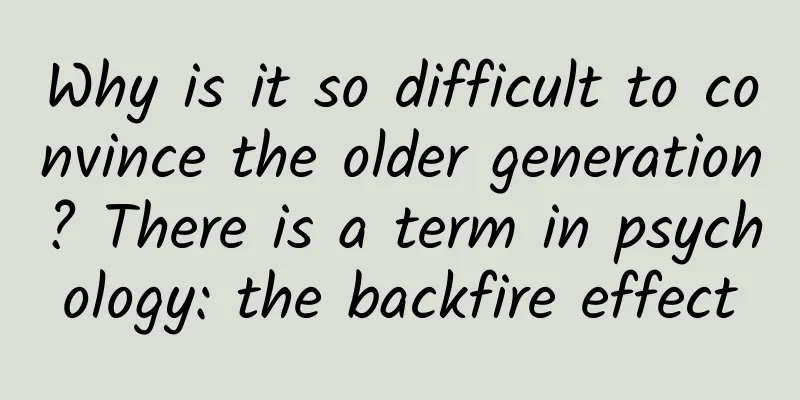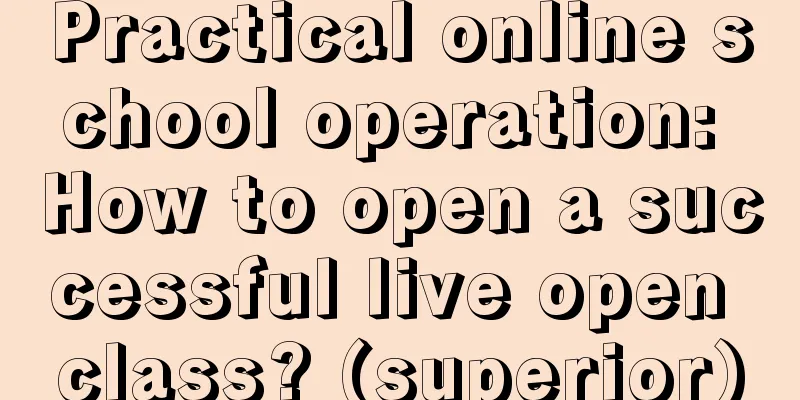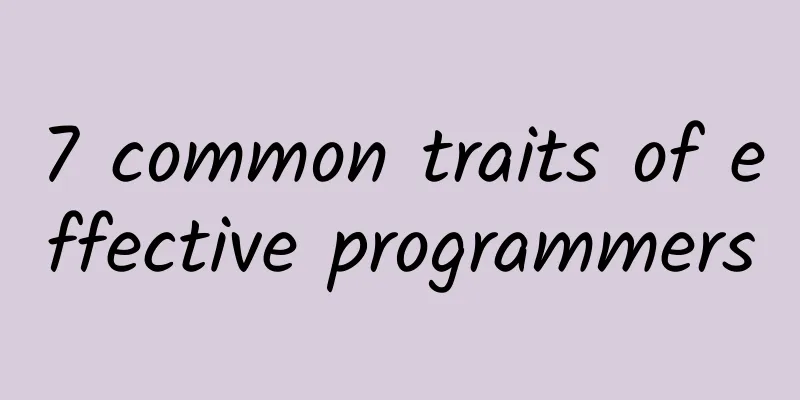Why is it so difficult to convince the older generation? There is a term in psychology: the backfire effect

|
Have you ever tried to persuade someone, but found that the more you presented facts and reasoned with them, the more stubborn they became? For example, you read a popular science article online saying that bone soup does not supplement calcium but increases purine levels, and you forwarded it to "Loving Family" but were kicked out of the group chat; you told your parents not to cut off the rotten part of rotten fruit and continue to eat it, but they said you were wasting... Image source: Screenshot of message on the Science Popularization China WeChat public account In fact, it is not only about convincing parents, but also convincing other people. Here are a few examples↓ Popular scientific knowledge that "smoking is harmful to health" can be found everywhere. Even on cigarette boxes, there are corresponding warnings printed on them. However, most smokers still turn a blind eye to the harms of smoking. Diapers are clean and convenient to use, but many families still argue about whether disposable diapers or cloth diapers are better. Even though scientific research has shown that vaccines can effectively prevent diseases, many people still have doubts about vaccines or even refuse to be vaccinated. What is reflected behind these phenomena is not only the dissemination of scientific knowledge, but also the comprehensive result of human psychology, emotions, habits and cognitive biases. In many cases, we do not rely entirely on rationality to judge the authenticity of information, nor do we rely on logical analysis to measure the pros and cons of choices. Instead, we tend to choose what to believe and what not to believe based on existing beliefs, emotions and social influences. Copyright images in the gallery. Reprinting and using them may lead to copyright disputes. Therefore, even if the truth and evidence are right in front of them, if it goes against some people's inherent cognition or touches their inner defense mechanism, they will still choose to stick to their own opinions, ignore the truth, or even oppose science. Your persuasion, rebuttal, or statement of facts will instead create a "backfire effect," which will become more and more counterproductive. What is the “backfire effect”? The "Backfire Effect" is a cognitive bias that refers to when people's beliefs are challenged by contrary evidence, even if the evidence is scientifically rigorous, logically clear, and convincing, people do not necessarily correct their mistakes or easily change their views. Instead, they will become more determined in their original positions. The "backfire effect" is like trying to put out a flame with wind. Instead of being put out, the fire burns more vigorously due to the intervention of external forces. Therefore, the "backfire effect" is also called the "rebound effect" or "counterproductive effect". In our daily lives, we often encounter the "backfire effect", especially on the Internet. For example↓ “It takes only a few words to spread a rumor, but it takes a lot of effort to refute it”: When someone tries to refute a rumor, even if scientific evidence and detailed explanations are provided, many people still choose to believe the rumor. Not only do they not accept the refutation, they may even think that the refutator has ulterior motives. "Online provocation": Netizens with different positions often engage in heated debates in the comment section. Even if someone tries to persuade with facts, data or logic, it is more likely to arouse the anger and counterattack of radicals. Sometimes, the two sides of the debate are no longer discussing the facts themselves, but to defend their own identity and values, which eventually turns into an emotional confrontation. Under what circumstances is the "backfire effect" more likely to occur? Of course, people are not completely unreasonable or stubborn. Both daily experience and research conclusions show that in most cases, corrective information is effective. When faced with factual evidence, people tend to adjust their views rather than stick to their prejudices. Just like you who like to watch or are watching "Science Popularization China", being able to actively access scientific knowledge and think is a manifestation of rationality and an open mind. Therefore, the "backfire effect" only occurs in certain specific circumstances: 1 When information is tied to self-worth Have you ever wondered why the older generation is less willing to accept diapers than the younger generation? In fact, this is not a problem with diapers themselves, but a problem with "baby-raising ability". For the older generation, cloth diapers are not only a tool, but also a symbol. They once raised their children with all their heart and soul, and this kind of dedication and sense of achievement has long been a reflection of their identity and value. Denying cloth diapers is often seen as a denial of their experience and ability. The promotion of disposable diapers seems to imply that their old ways have been eliminated. This emotional conflict is the biggest obstacle to accepting new things. Copyright images in the gallery. Reprinting and using them may lead to copyright disputes. Many beliefs are not just judgments about facts, but also projections of personal identity and values. When something new challenges these beliefs, it is like breaking the load-bearing wall that builds self-worth, and the entire psychological building built on it will become precarious. Therefore, the difficulty in accepting new things does not lie in the new things themselves, but in how to make people retain their recognition of their self-worth while accepting the changes. 2 When strong negative emotions are aroused Imagine that every time someone tries to correct your thoughts or criticize your views, but you are unable to refute them in person due to the occasion and the relationship, will your inner subtitles automatically scroll across the screen: "Rebound, rebound, rebound all!" At this time, whether what the other person said is true or not is actually not important. You may not care anymore, but just instinctively feel offended, denied or even attacked. In fact, it is not just a matter of information content, but also a matter of communication style and psychological cognition. Psychological research shows that the acceptance of information depends not only on the content, but also on the emotion and tone of the message when it is delivered. Copyright images in the gallery. Reprinting and using them may lead to copyright disputes. When negative emotions are aroused, the brain will prioritize emotional defense mechanisms to try to protect self-esteem and emotional boundaries. This emotional response often interferes with logical judgment and even leads to cognitive biases such as the "backfire effect." In this case, people are more likely to focus on protecting their emotions rather than rationally evaluating the objectivity or value of information. How to avoid the “backfire effect”? When the information you want to correct or the point you want to convey conflicts with the other party's core beliefs, or when the way you express it triggers strong negative emotions in the other party, it is easy to trigger the "backfire effect." To avoid this, communicators need to create a suitable environment, such as: Try to keep the discussion in a calm and rational atmosphere and reduce emotional interference; Give the other person enough time to digest new information, rather than rushing or forcing their opinion. If you want to truly "convince people with reason", you can try the following tips: 1 Use “weak arguments” to persuade Whether in debate or persuasion, we often tend to directly throw out what we think is the strongest and most powerful argument and evidence, trying to hit the target with one blow. Research has found that strong arguments are often ineffective because strong arguments may imply that the other party’s past position is wrong or even harmful, and will directly challenge the other party’s core beliefs. Not only will it fail to convince the other party, but it will make the other party feel threatened and refuse to accept it. Copyright images in the gallery. Reprinting and using them may lead to copyright disputes. For example: "Cloth diapers are unhygienic and can easily cause diaper rash, which is not good for children." For those who support cloth diapers, such statements will not only not prompt them to think about the disadvantages of cloth diapers, but will trigger strong denial emotions, because this shakes their self-cognition of "I love children". Faced with such threats, people usually instinctively take a defensive posture, or even firm up their position, without seriously considering the rationality of the argument itself. Using milder and more acceptable "weak arguments" is often more likely to change people's positions and beliefs↓ For example: "Diapers are clean and convenient. They can save you some energy and you won't be too tired!" 2 Use "brief and concise" to explain People are more likely to accept simple and easy-to-understand explanations, while complex or lengthy information often makes people feel exhausted. When faced with complex explanations, people usually feel that they are "too troublesome" or "too difficult to understand", so they choose to refuse to accept them, or even believe more in those simple and intuitive misconceptions. For example, some people believe that "vaccines are harmful". Scientists try to refute this view with complex professional terms and data, but these explanations are too technical for ordinary people to understand. Instead, they find the statement "vaccines are harmful" simple and direct, easier to accept, and even more resolute in their own misconceptions. Therefore, instead of using cumbersome professional terms, it is better to try to use intuitive metaphors or popular language to explain concisely. For example: Don’t say: “According to the working principle of the vaccine, mRNA vaccines encode fragments of the virus’ spike protein to trigger the body’s immune system to produce neutralizing antibodies, thereby enhancing the immune response to specific viruses. This technology has been proven to be safe and effective through decades of research and multiple rounds of clinical trials.” · Should say: "The vaccine is like a fire drill. It lets the body's immune system know what a 'fire' (virus) looks like in advance and learns how to respond quickly. When a real 'fire' occurs, the immune system can put it out in time and prevent the virus from causing too much damage." Finally, it is important to note that whether we are trying to persuade others or facing others' rebuttal, both sides may be affected by the "backfire effect". In order to avoid falling into the "backfire effect", we need to learn to calmly examine the evidence that contradicts our assumptions and calmly accept the possibility that "we may be wrong". Only in this way can we truly think rationally and have open discussions. Of course, if you like to read Science Popularization China and have read this far, I believe you must be a person who is willing to learn, good at thinking, and willing to accept different opinions! This open mind is the key to avoiding the "backfire effect" and the best embodiment of the scientific spirit! I hope that you and I who have been on the road of exploring the truth can always maintain humility and curiosity, constantly pursue a broader vision, and use reason and curiosity to understand the world. References [1] Steven Novella. (2020). How to Think Independently. CITIC Publishing Group. ISBN: 9787521715965 [2]Weiss, HM, & Cropanzano, R. (1996). Affective Events Theory: A theoretical discussion of the structure, causes and consequences of affective experiences at work. Research in Organizational Behavior, 18, 1–74. [3]The Backfire Effect – You Are Not So Smart [4]The Backfire Effect: Why Facts Don't Always Change Minds – Effectiviology[5]Want to Win a Political Debate? Try Making a Weaker Argument - Pacific Standard Planning and production Author: Su Jing, National Level 2 Psychological Counselor Reviewer: Fan Chunlei, Associate Researcher, Institute of Psychology, Chinese Academy of Sciences Planning丨Fu Sijia Editor: Fu Sijia Proofread by Xu Lailinlin |
<<: Return to the Deep Blue: Whales are mammals, so how can they swim in the ocean like fish?
Recommend
Brand marketing, how does Okamoto capture consumers?
In the context of consumption upgrading, Okamoto ...
Why is the Xbox One sales volume less than 40 units during the bleak "Double Eleven"?
Since Singles’ Day became a shopping festival, Do...
“Cats are treacherous, dogs are loyal”, are cats really heartless?
"It's so nice to pet a cat, it's so ...
Can I surf the Internet on the moon? Can I grow vegetables? Latest answers!
The National Space Administration announced on Se...
A creative solution for high conversion advertising!
When doing information flow promotion, the page c...
Breaking news! Xiaopeng Motors is on fire, and a large number of car owners are collectively defending their rights and returning their cars today
Automotive Industry Focus (autochat.com.cn) July ...
The battle for platform KOL has entered a hand-to-hand fight! How to create “big V influence”?
What do you think? The KOLs on a platform are mor...
Turn your marketing campaign into a profitable business
Any large-scale marketing campaign will inevitabl...
Have cockroaches in Guangdong "evolved"? This speculation is unscientific!
According to Guangdong Radio and Television Stati...
Sister Abao "Ordinary People's Workplace Counterattack Training Camp"
Course Catalog ├──Chapter 1 Opening Ceremony | └─...
Digital RMB is so popular! Alipay can’t hold back
[[395030]] With the popularity of digital RMB har...
Behind WeChat’s crazy “ban”: the pain of WeChat Pay
WeChat has been really willful recently, banning ...
Spiders play mahjong? This little spider throws a four-piece card at you!
What is March 14th? White Day? Pi Day? Not only t...
How to successfully create a "viral" message
Introduction: As a marketer, understanding consum...
How to take a photo using WeChat on PC? Introduction to the use of WeChat Tap on PC
Can I use WeChat Tap on PC? Everyone is worried a...









